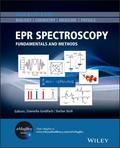EPR Spectroscopy
Fundamentals and Methods
EMR Books (Band Nr. 1)

1. Auflage April 2018
648 Seiten, Hardcover
Wiley & Sons Ltd
This unique, self-contained resource is the first volume on electron paramagnetic resonance (EPR) spectroscopy in the eMagRes Handbook series. The 27 chapters cover the theoretical principles, the common experimental techniques, and many important application areas of modern EPR spectroscopy. EPR Spectroscopy: Fundamentals and Methods is presented in four major parts: A: Fundamental Theory, B: Basic Techniques and Instrumentation, C: High-Resolution Pulse Techniques, and D: Special Techniques.
The first part of the book gives the reader an introduction to basic continuous-wave (CW) EPR and an overview of the different magnetic interactions that can be determined by EPR spectroscopy, their associated theoretical description, and their information content. The second provides the basics of the various EPR techniques, including pulse EPR, and EPR imaging, along with the associated instrumentation. Parts C and D builds on parts A and B and offer introductory accounts of a wide range of modern advanced EPR techniques, with examples of applications. The last two parts presents most of the new advances that do not appear in most of the classical EPR textbooks that focus on CW EPR.
EPR Spectroscopy: Fundamentals and Methods contains, in concise form, all the material needed to understand state-of-the-art EPR spectroscopy at the graduate school/research level, whilst the editors have ensured that it presents the topic at a level accessible to newcomers to the field and others who want to know its range of application and how to apply it.
Series Preface xv
Preface xvii
Part A: Fundamental Theory 1
1 Continuous-Wave EPR 3
Art van der Est
2 EPR Interactions - g-Anisotropy 17
Peter Gast and Edgar J.J. Groenen
3 EPR Interactions - Zero-field Splittings 29
Joshua Telser
4 EPR Interactions - Coupled Spins 63
Eric J.L. McInnes and David Collison
5 EPR Interactions - Hyperfine Couplings 81
Marina Bennati
6 EPR Interactions - Nuclear Quadrupole Couplings 95
Stefan Stoll and Daniella Goldfarb
7 Quantum Chemistry and EPR Parameters 115
Frank Neese
8 Spin Dynamics 143
Akiva Feintuch and Shimon Vega
9 Relaxation Mechanisms 175
Sandra S. Eaton and Gareth R. Eaton
Part B: Basic Techniques and Instrumentation 193
10 Transient EPR 195
Stefan Weber
11 Pulse EPR 215
Stefan Stoll
12 EPR Instrumentation 235
Edward Reijerse and Anton Savitsky
13 EPR Imaging 261
Boris Epel and Howard J. Halpern
14 EPR Spectroscopy of Nitroxide Spin Probes 277
Enrica Bordignon
Part C: High-Resolution Pulse Techniques 303
15 FT-EPR 305
Michael K. Bowman, Hanjiao Chen, and Alexander G. Maryasov
16 Hyperfine Spectroscopy - ENDOR 331
Jeffrey R. Harmer
17 Hyperfine Spectroscopy - ELDOR-detected NMR 359
Daniella Goldfarb
18 Hyperfine Spectroscopy - ESEEM 377
Sabine Van Doorslaer
19 Dipolar Spectroscopy - Double-resonance Methods 401
Gunnar Jeschke
20 Dipolar Spectroscopy - Single-resonance Methods 425
Peter P. Borbat and Jack H. Freed
21 Shaped Pulses in EPR 463
Philipp E. Spindler, Philipp Schöps, Alice M. Bowen, Burkhard Endeward, and Thomas F. Prisner
Part D: Special Techniques 483
22 Pulse Techniques for Quantum Information Processing 485
Gary Wolfowicz and John J.L. Morton
23 Rapid-scan EPR 503
Gareth R. Eaton and Sandra S. Eaton
24 EPR Microscopy 521
Aharon Blank
25 Optically Detected Magnetic Resonance (ODMR) 537
Etienne Goovaerts
26 Electrically Detected Magnetic Resonance (EDMR) Spectroscopy 559
Christoph Boehme and Hans Malissa
27 Very-high-frequency EPR 581
Alexander Schnegg
Index 603
Daniella Goldfarb is Professor in the Department of Chemical Physics at the Weizmann Institute of Science in Rehovot, Israel.
Stefan Stoll is Assistant Professor in the Department of Chemistry at the University of Washington in Seattle, Washington, USA.


